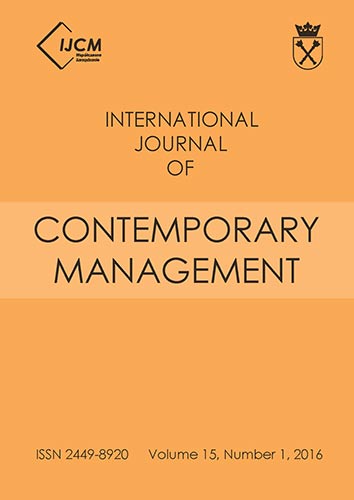Cultural Conditioning of Lean Management in Great Britain
Cultural Conditioning of Lean Management in Great Britain
Author(s): Aneta ParkesSubject(s): Economy, Business Economy / Management
Published by: Wydawnictwo Uniwersytetu Jagiellońskiego
Keywords: culture; organisational culture; lean management, cultural conditioning of lean management; Great Britain
Summary/Abstract: Background. Implementation and development of the management concept called lean management can be influenced by the culture of an organisation that is mostly determined by the national culture of its representatives. That is why it is important for successful lean management implementation to understand different cultural conditions and how compatible they are with the lean management culture (cf.: Jakonis, 2011, 2012; Parkes, 2014).Research aims. The aims of the research, which results have been presented in the article, were: the organisational culture and the cultural conditioning of lean management on the example of a case study in Great Britain.Methodology. The retrospective case study was carried out in 2014 in Great Britain. The main sources of data were: a semi-structured interview (an interview with a standardised list of requested information) and a narrative interview carried out with a long-time company employee, as well as the company’s documents. Additional sources of data were: unstructured conversations with the former respondent’s co-workers and participant observations carried out in trade and service organisations during my professional and voluntary work.Key findings. On the basis of the research, the characteristics of researched organisational culture, as being different from the lean management culture according to the level of basic cultural assumptions were presented. Although, shaping lean culture should be a part of lean management implementation, the more an organisational culture differs from lean management culture, the more difficult it could be in my opinion to implement a lean management system (cf.: Jakonis, 2011, 2012; Parkes, 2014).At the same time, there were elements of lean culture in the researched culture, as a result of secondary socialisation, which can indicate that it is not only desirable, but also possible to create a lean management culture (at least to some degree) while implementing the lean management system into the organisation, even in conditions of different culture. It is debatable to what degree we can change the culture, how to effectively sustain that change and if we possibly have to deal with other factors as well, different from the presented characteristics, but also important from the perspective of lean management implementation
Journal: International Journal of Contemporary Management
- Issue Year: 15/2016
- Issue No: 1
- Page Range: 49-65
- Page Count: 17
- Language: English

